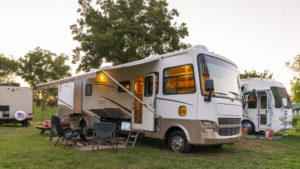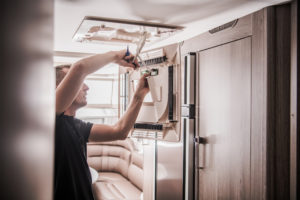6 Things You Need to Know About RV Insurance
Over 11 million households in the United States own a recreational vehicle (RV). This is an increase of 62% in RV ownership in the last two decades. RVs provide families and individuals with the freedom to travel the country without the concern of costly nightly accommodations. Protecting your RV requires selecting the right RV insurance policy that meets your needs.
Here are 6 things you need to know to choose the right RV insurance policy protection for your RV.
1.) RV Insurance Legal Requirements

The general rule is that if an RV can be driven then separate RV insurance is required. Individuals who own Class A, B and C recreational vehicles are legally required to carry minimum insurance coverage.
Each state has developed its own standard for insurance coverage requirements. Most states require RV owners to carry basic liability insurance and personal injury protection (no-fault states).
Towable Trailers
Most states do not require towable trailers to be covered under an RV insurance policy. Be sure to check the details in your auto insurance policy to ensure that your trailer is covered in the event of an accident.
Financed and Leased RVs
Financed or leased RVs are required to carry full-coverage RV insurance.
Regardless of the legal coverage that is required in your state, it is always a wise idea to invest in additional coverage to protect your assets.
2.) Types of Coverage
RV insurance involves many of the same coverages provided by traditional car insurance policies. It is important to consider your unique RV needs when selecting the amount of coverage for each type of policy.
Basic Coverage Includes:
- Comprehensive
- Collision
- Bodily Injury
- Uninsured Motorist Coverage
Comprehensive coverage is intended to protect your RV in the event of unexpected damages, including theft, fire, weather-related damages, etc.
3.) Specialized Coverage

There are several optional RV insurance options that can be a life-saver when unexpected roadside breakdowns and other damages occur.
Roadside Assistance
Roadside assistance coverage providers RV owners with towing to the nearest RV repair facility in the event of an unexpected breakdown.
RV Roadside Assistance Needs May Include:
- Battery Failure
- Flat Tires
- Fluid Needs
- Weather-Related Entrapment
RV roadside assistance may also cover reentry into the vehicle in the event of an accidental lock-out. These optional coverages save RVers time, and money, and eliminate stress in the event of a minor mechanical issue or a major breakdown.
Vacation Liability
Vacation liability is an optional coverage that protects you in the event that you accidentally cause harm to another individual and/or their property while temporarily parked at a designated campsite.
4). Part-Time VS Full-time RV Insurance
The type of coverage that an RV owner needs varies greatly based on several factors, including how often you drive your vehicle. The more time that you spent driving your RV, the more likely that an accident or breakdown will occur.
Part-Time RV Insurance
Part-time RV insurance policies cover recreational vehicles that are used for short trips throughout the year. These policies cover the basic damages that could occur in the event of a collision, including property damage and bodily injury.
Full-Time RV Insurance
Full-time RV insurance provides coverages for RVs that are used frequently and/or as full-time residences. The general rule is that any time spent in an RV of over 150 nights a year is considered full-time.
5.) Cost of RV Insurance
There are several factors that affect the policy rates for a recreational vehicle policy. The amount of time a person spends in their RV is one of the major factors that affect insurance rates. Full-time RVers will spend more money on insurance than part-timers.
Other RV Policy Rate Factors Include:
- Value of RV
- Selected Coverages
- Garaging Location
- Driving Record
Individuals with RVs that are equipped with additional safety features may receive discounts on their policies. For example, anti-lock brakes, security systems, etc.
Do Not Manipulate RV Insurance Coverage
It can be tempting to manipulate your answers when building your RV policy in an attempt to pay lower rates. This would be a highly regrettable decision in the event of an accident involving property damage or injury.
6.) Total Loss Insurance
There are several types of policies available to cover your RV in the event of a total loss accident. These include replacement value, actual cash value, or agreed value coverage.
Replacement Value
Replacement value coverage protects the purchase of a brand new recreational vehicle. Replacement value coverage provides RV owners with a new replacement vehicle in the event that a total loss occurs within a set time frame, generally 5 years.
Cash Value Coverage
RV owners who invest in cash value coverage are protected outside of the allotted time frame. The insurance company will reimburse RV owners for the current cash value of the RV in the event of a total loss.
Agreed Value Coverage
Agreed value coverage is the best option for RVers who own an older vehicle. The RV owner and the insurance company agree to a predetermined value for the vehicle in the event of a total loss.
Contact Your Home or Auto Insurance Provider
Many home and auto insurance companies provide discounts to individuals who bundle their home, auto, and RV insurance. Reach out to your provider for a quote and compare it with rates offered by other companies to get the best price for your unique coverage needs.
Campground Membership Outlet
RVers save money during their travels with campground memberships. Campground Membership Outlet has been in the campground membership resale business for over 25 years.
Contact the experts at Campground Membership Outlet and find a custom campground membership to meet your unique RV travel needs.
